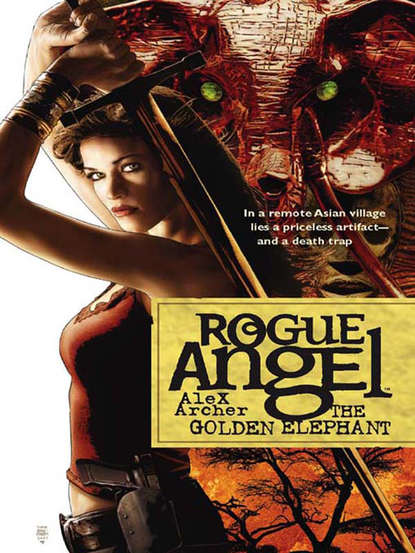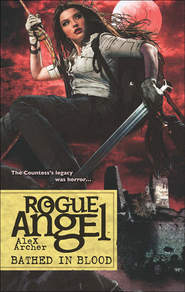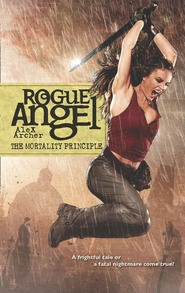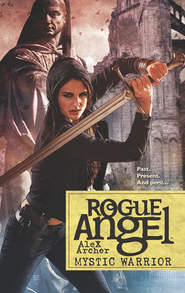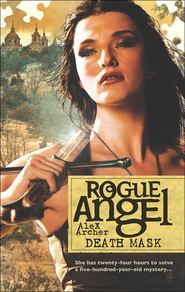По всем вопросам обращайтесь на: info@litportal.ru
(©) 2003-2024.
✖
The Golden Elephant
Автор
Год написания книги
2019
Настройки чтения
Размер шрифта
Высота строк
Поля
Chapter 22
Chapter 23
Chapter 24
Chapter 25
Chapter 26
Chapter 27
Chapter 28
Chapter 29
Chapter 30
Chapter 31
Chapter 32
1
Tomb of the Mad Emperor
“Oops,” Annja Creed said as she felt something give beneath the cleated heel of her Red Wing walking shoe.
The floor of the passageway was caked inches thick in dust. Annja couldn’t see the trigger. She had sensed more than heard something like a twig snapping.
Already in motion, Annja dived for the floor. She heard a grind, a rumble, a rusty creaking. Then with a hefty metallic sound something shot from the stone walls above her.
Catching herself on her hands, Annja looked around by the light of her bulky hand lantern, which lay several feet ahead of her. She spotted three bronze spears spanning the two-yard-wide corridor a yard above the floor. They were meant to impale any unwary intruder. That included her.
Annja shook her head. “Emperor Lu may or may not have been crazy,” she muttered. “But he sure was paranoid.”
The echoes of her words chased each other down the slanting corridor, deep into the earth’s dark recesses.
C AUTIOUSLY A NNJA WIGGLED forward. As her weight came off the hidden floor plate the spears began to retract into the walls. By the time she reached her lantern they had vanished. The stone plates that covered the ports through which the spears had thrust out swung back into place.
Coughing on the dust she had stirred up doing her snake act, Annja sat up and shone her light on the walls. She could see no sign of where the spears had come from. The walls had been painted with some kind of murals, perhaps once quite colorful. They had faded to mere swirls and suggestions of faint color. They worked to camouflage the trap, though.
She shook her head and picked herself up. “Got to move,” she told herself softly as she dusted off the front of her tan shirt and khaki cargo pants. This would be her only shot. With the construction of a giant dam nearby, the floodwaters were rising. By tomorrow they would make the subterranean tunnels unsafe.
With redoubled caution she made her way deeper into the lost emperor’s tomb.
The corridor walls were hewed from a yellow limestone. Tests showed it had been quarried in some hills several miles away. The passageway air was cool and dry. It smelled of stone and earth.
Some indeterminate distance down, as Annja began to feel the weight, not just of years, but of millions of tons of earth pressing upon her, the corridor leveled. It had taken several bends and a couple of doglegs, and had plateaued briefly, as well. Annja wasn’t sure whether the zigs and zags had some ritual significance, were meant to additionally befuddle an interloper or were simply to prevent a cart full of spoil from running all the way back down to the bottom during the digging of the corridor. She suspected it was all of the above.
Far down the hallway, in which she could just stand upright, Annja saw that something was blocking the way. Could that be the door to Lu’s actual tomb? she wondered. Her heart beat quickened. According to the ground-penetrating radar scans, it could be. The last Chinese team to come down here had intended to open the bronze door to the burial chamber proper. She had no idea whether they had or not.
The Beijing University officials who had hired Annja suggested that they felt the last team had indeed made some major discoveries and had then departed by some currently unknown entrance to the great mound before vanishing. There was nothing intrinsically unlikely about that. Such huge structures often had multiple entrances. But she was being asked to play archaeology cop—to find out if the tomb had been plundered and, if possible, to trace the thieves. She was certainly willing enough. Like any real archaeologist she had an unremitting hatred of tomb robbers.
“Of course that assumes a lot of ifs,” Annja said aloud. Her voice, echoing down the chamber, reassured her. Something about the place bothered her.
She flashed her light down the corridor. She thought she saw a hint of green from the obstruction. She knew that was consistent with bronze doors. The copper in the alloy turned green as it oxidized. Otherwise bronze wasn’t prone to corrosion, as iron and steel were.
I wonder if I should have looked more closely for bloodstains around those spear traps, she thought. The two expeditions that had returned had warned about various booby traps.
But she wasn’t here to do forensic work. Time pressed. So did the billions of tons of water that would soon be rushing to engulf the mound.
As she moved forward toward the door she became aware of a strange smell. A bad smell, and all too familiar—the stench of death.
It grew stronger as she approached the door. And then she fell right into another of Emperor Lu’s little surprises.
The floor tipped abruptly beneath her. The right side pivoted up. She dropped straight down.
Without thought she formed her right hand into a fist. Obedient to her call, the hilt of the legendary blade of Joan of Arc filled her hand. Falling, she thrust the sword to her left and drove it eight inches into the pit’s wall.
It was enough. Grabbing the hilt with her left hand, as well, she clung desperately and looked down.
The hint of scent had become a foul cloud that enveloped her. She choked and gagged. The floor trap was hinged longitudinally along the center. The pit was twenty feet long and sank at least twelve feet deep. Bronze spearheads jutted up from the floor like snaggled green teeth.
Entangled and impaled among them, almost directly below her, lay a number of bodies. She couldn’t tell exactly how many; they had become tangled together as they fell onto the spears. The glare of her lantern, which lay tilted fortuitously up and angled in a corner, turned them into something from a nightmare.
One man hung alone to one side, bent backward. His mouth was wide open in a final scream at the spearhead that jutted two feet upward from his belly. The remnants of what looked like a stretcher of sorts, possibly improvised out of backpack-frames, lay beneath him.
At the shadow-clotted base of the pit she could just make out the dome of a skull or the multiple arch of a rib cage protruding from ages of drifted dust. The missing Chinese archaeology team were not the first victims.
She looked up. She had fallen only a couple of yards below the pit’s lip. The sword had entered the wall blade-vertical. It flexed only slightly under her weight. She knew it could break—the English had done it, when they burned its former holder at the stake—but it didn’t seem strained at the moment.
Unwilling to test it any longer than she had to, she swung back and forth experimentally, gaining momentum. Then she launched her legs back and up and let go.
Whatever kind of graceful landing she was hoping for didn’t happen. Her legs and hips flopped up onto the floor. Her head and upper torso swung over empty space—and the waiting bronze spearheads. As her body started to topple forward she got her hands on the rim of the pit and halted herself. Her hair escaped from the clip holding it to hang about her face like a curtain.
With something like revulsion she threw herself backward. She sprawled on her butt and elbows, scraping the latter. Then she just lay like that awhile and breathed deeply.
The sword had vanished into the otherwhere.
One thing her life had taught her since she had come, unwittingly and quite unwillingly, into possession of Joan of Arc’s Sword was to bounce back from the most outlandish occurrences as if they were no more significant or unusual than spilling a cup of coffee.
“That got the old heart rate going,” she said.
She slowly got to her feet. The trapdoor swung over and began to settle back to the appearance of a normal, innocuous stretch of floor. As it eclipsed the beam of her lost lamp, shining up from the pit like hellfire, she reached up to switch on her headlamp. Its reassuring yellow glow sprang out as the glare was cut off.
It wasn’t very powerful. The darkness seemed to flood around the narrow beam, with a palpable weight and presence. “It’ll be enough,” she muttered. “It has to be.”
Putting her back to the left-hand wall, she edged down the corridor. The dust, which had settled in the past few weeks, hiding the doomed expedition’s footsteps, had been dumped into the pit, except for a certain quantity that still swirled in the air and rasped her lungs like sandpaper. The clean patch of floor, limned by the white light shining from below, made its end obvious.





